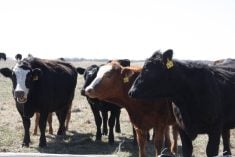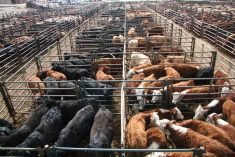Private equity makes inroads as more rural veterinarians sell to large companies seeking to capitalize on profit potential
Gone are the days of veterinarians hanging out their shingle on a store front in the small, rural towns that dot Alberta as they run mixed animal practices and function like any other independent, locally owned small business.
The James Herriot-style vet trundling around to farms and ranches has become a thing of the past, and today, some veterinary clinics are big business — multinational billion-dollar business —thanks to the growing involvement of corporate consolidators and private equity.
“Traditionally, corporate consolidators were buying up urban small-animal practices,” says Dr. Cody Creelman, owner of Fen Vet Clinic in Airdrie, Alta.
Read Also

VIDEO: Ag in Motion documentary launches second season
The second season of the the Western Producer’s documentary series about Ag in Motion launched Oct. 8.
“That started drawing the eye of the Competition Bureau and so they’ve needed to branch out into surrounding areas.”
There are now mixed rural practices in agricultural towns including Dunmore, Didsbury, Onoway and Cremona that are corporately owned.
Corporate consolidators have been attracted to veterinary medicine for the profit potential. For a variety of reasons, including retirement and succession planning or looking for a better work-life balance, veterinarians sell their clinics to consolidators who centralize human resources, marketing, procurement and other non-medical support and can purchase bulk medications at a discount.
Although the provincial regulator — the Alberta Veterinary Medical Association (ABVMA) — must issue permits to the operator(s), there is no other regulatory framework outside this provincial legislation that controls who can or can’t own a clinic. Applying for a permit can be done from the organization’s website.
Across most North American jurisdictions, veterinary clinics must be at least 51 percent owned by a veterinarian. That is a requirement on paper but in practice, Creelman says consolidators can work around the regulation by setting up shell companies to fulfil the ownership requirements.
Corporate consolidator Vet Strategy made headlines when it was sold to American private equity firm Berkshire Partners in 2020 and then again to IVC Evidensia the following year. IVC Evidensia is a privately-owned company with headquarters in the United Kingdom and board members including representatives from Nestlé. According to Vet Strategy’s website, it is now “one of the largest veterinary care groups in the world, with almost 30,000 employees and 2,000 clinics and hospitals across 17 countries.”
With 42 clinics across Alberta, as far north as Grande Prairie but mostly concentrated in and around Edmonton, Red Deer, Calgary and Medicine Hat, Canadian Business called Vet Strategy one of the fastest-growing companies in Canada in 2020. In Alberta, its holdings include seven practices with a large animal component.
The company did not respond to requests for comment for this story.
Dr. Beth Davidow, a Seattle-based ER critical care specialist who monitors her industry and writes about it on her website, The Veterinary Idealist, has watched the growing involvement of private equity in the industry with skepticism. Private equity is a fairly recent development in Canada but it’s been part of the American landscape for much longer and Davidow thinks food animal producers should be concerned.
“There’s big short-termism to private equity,” she says. “These firms have a financial and fiduciary duty to turn a profit for their investors — you must show growth and profit. Your goal is not operational improvement, it’s ‘how fast can I scale in three to five years to get money back for my investors.’ The ‘why’ is very different.”
Creelman began his own career as a bovine specialist and says cows were his comfort zone.
“I loved my food animal practice,” he says.
“I loved going out to do farm calls. Those are amazing, salt-of-the-earth people. You’d find cinnamon buns on the truck seat. It was awesome.”
But large animal clients don’t keep the lights on, he says.
“In a mixed animal practice, food animals are break-even at best.”
What’s to stop consolidators operating in Alberta from taking a hard look at the profit ledger and reducing or closing less-profitable large animal services?
It won’t be the Alberta Veterinary Medical Association.
“We don’t have the authority to approve the sale of clinics,” says Dr. Phil Buote, ABVMA deputy registrar and complaints director “but we do know that the federal Competition Bureau is paying attention. I would be surprised if we didn’t get some action on this (but) it might take a few years.”
The clinics’ customers may be the only ones not fully aware of the trend.
“I get calls from new clients that their clinic was sold two years ago and they had no idea,” says Creelman.
In the United States, Davidow was part of a group trying to sort out clinic ownership and provide information to consumers. It wasn’t easy.
“They don’t want people to know how big they are and what they own,” she says. “There are only three or four groups and people know it’s not attractive to consumers.”
Helping to provide some transparency is important to the ABVMA, says Buote.
“It’s something we’ve been working on,” he says. “Anyone can go to the ABVMA website and search for veterinary care. The permit holder will come up on the clinic’s profile.”
A search on the ABVMA site showed the permit holder’s name was present, though ownership wasn’t clear. There is no indication whether the clinic is locally owned and operated or independent. Holding companies and numbered companies as well as consolidators appear on the listing.
The Alberta government is aware of the veterinary shortage, though when asked for comment on the role corporate consolidators may play in exacerbating the situation, Ministry of Agriculture, Forestry and Rural Economic Development officials seemed to be caught off guard.
Minister Nate Horner has made recent funding announcements for veterinary schools to help grow the number of students in these programs and Creelman made clear that consolidators’ clinic purchases aren’t the sole cause for the shortage of veterinarians, registered veterinary technicians and other support staff.
Enticing veterinarians into rural practice where mixed animal clients are more common isn’t as straightforward as a “help wanted” listing in a trade paper.
“Practice ownership doesn’t lend itself to the 8-to-5 work day,” says Buote.
Davidow says the situation in the U.S. is the same.
“There’s a gender and lifestyle switch,” she says. “Vet schools are 80 percent female and in many rural practices with two vets, you’re on call 50 percent of the time – doing calls in the middle of the night, by yourself.”
In a written statement, Horner’s office said, “we strongly encourage new and experienced veterinarians to practice in rural areas of Alberta, which are full of opportunities to expand their skill set and make an impact.”
Maybe so, says Davidow, but as consolidators grow their reach, not every veterinarian wants to work in corporate clinics.
“There are quite a lot of vets who are realizing working for these companies is not that fun,” she says. “(The big companies are) not in it because they believe in good animal care.”
The drive to efficiency means that cost-cutting and call volume are among the ways to increase profits.
Additionally, contract agreements at the sale of the clinics, including non-compete clauses, can take veterinarians and support staff out of practice or compel them to work for the consolidator within a certain radius for the duration of the agreement.
These non-compete clauses may include veterinarians and staff who weren’t in favour of selling the practice but were either outvoted by their business partners and/or face the prospect of leaving their communities or keeping their heads down and soldiering on, a scenario Creelman says plays out fairly regularly.
In the U.S., where veterinary shortages are also acute, Davidow says her state has taken steps to regulate non-competes with stipulations that they can’t be longer than 18 months and aren’t applicable if the signer has made less than $100,000. That is designed to protect younger, newer veterinarians and medical staff.
According to Davidow, some consolidators find that scrapping non-competes entirely has become an effective recruitment strategy and ensures competition in the marketplace.
“Non-compete provisions should not be legal if it means there isn’t adequate animal care in that area,” she says.
Adds Buote: “Anything that would keep a veterinarian out of clinical practice, I would find concerning.”.
As for Creelman, his passion for his industry started young and was helped along by those James Herriot books.
“So many of us cut our teeth reading them,” he says with a laugh. “It inspired me so much. It was so noble. … Two years ago, Herriot’s corporate consolidated practice announced they would no longer see food animals. It’s going to look really different, really quickly.”

















